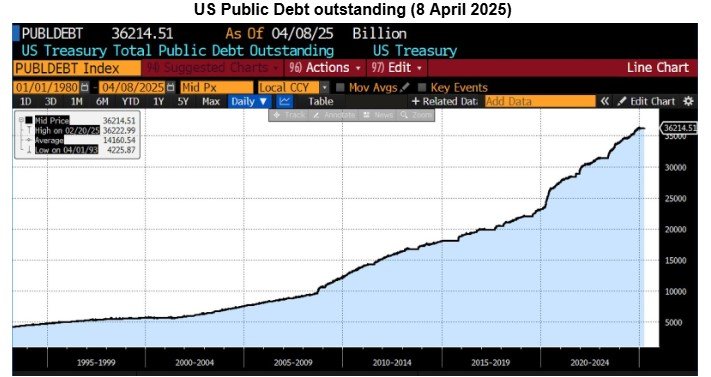Jon Hartley serves as interlocutor in “Revisiting Empirical Macroeconomics with Robert Barro” (Hoover Institution, Capitalism and Freedom Podcast, March 25, 2025, audio and transcript available). Here are a few of the comments from Barro that especially caught my eye.
One basic question in economics is about “the multiplier”–that is, how much will an increase in government spending boost the size of the economy. If the boost in government spending doesn’t increase the size of the economy, the multiplier is zero. If it raises the size of the economy one-for-one, then the multiplier is one. Optimists about governmetn spending sometimes claim the multipler is more than one, while pessimists hold that it might be negative. Barro argues that, at least in most settings, the evidence supports a multiplier between zero and one. Barro says:
Looking at the variations in military spending in the US context over a fairly long time period is a very good setting for trying to isolate spending multipliers associated with basically exogenous movements in the amount of government expenditure. You wouldn’t do this for many countries during wartime because the direct destructive effects of wartime tend to be dominant. And typically in wartime you would estimate negative spending multipliers associated with military outlays. But the US is different in that respect. It doesn’t have that kind of massive destruction associated, particularly with World War II.
So it was a very good setting, I think, for looking to isolate the effect of these exogenous and large spending changes. So the multipliers were positive. I mean, the right baseline is 0, not 1. If the multiplier is 1, it means you’re basically getting as much output as you’re using up, which makes it sound like it’s a free thing … But the right benchmark is a multiplier of zero because that means that in order to get the extra spending let’s say for military, you have to cut back on other spending one for one. …
So we found multipliers that were more like a half or something, which means that you have to pay for 50% of the extra. So it’s a multiplier of one and above is kind of completely ridiculous. I mean, a multiplier above one means you’re not only getting the military spending for free, you’re getting something extra for coming from nowhere. It should be a very surprising result to have multipliers that are above one. And you certainly wouldn’t find that in normal times or in some kind of long run setting.
Inflation reduces the value of existing debt. Thus, if government spending leads to an increase in inflation–and thus reduces the value of existing government debt–there is a sense in which the government used inflation to “pay for” its spending increase. Here’s Barro:
So if you have a massive increase [in government spending], such as the transfer payments, even more under Biden than under the first Trump administration, a way to avoid paying for that by cutting other spending or by raising taxes is by having a inflation that’s surprising from a perspective of a pre crisis period. And that basically wipes out a lot of real value of the government bonds that are outstanding and it amounts to a very large temporary source of revenue which can be something like 10, 15% of the GDP. So it’s not a minor deal. And that’s empirically about what happened in the US and also in other places. …
[P]eople don’t like the idea that it might not have been completely crazy to pay for the expenditure in substantial part through this surprise inflation. I get a lot of grief on that point from people who normally, who normally are on my side about things because they just want to think of the inflation as being stupid and being dramatically harmful. So I think what was harmful is the excessive fiscal expansion, particularly under Biden. It was unnecessary to have that vast increase in transfer payments, but given that you had it, we effectively paid for most of it through the surprise inflation. And maybe that part was not so crazy because the alternatives would have been also very costly.
Back in the 20th century, it was common to study causes of economic growth by looking a patterns across countries. However, these studies were inevitably about correlations, not necessarily causation. Thus, a lot of economic research has now shifted to looking for experiments–either designed or “natural” in some way–where causation is more clear. Barro argues that for broad topics of economic growth, cross-country regressions should continue to be viewed as a productive approach.
if you want to think about what matters for growth and, and how it depends on policies and things like property rights and fertility behavior and education and all those, the natural empirical arena to consider there is the cross country experiences where you have a lot of variety in terms of different policies and institutions being put into place and you have some hope from that of trying to isolate what things matter for long run economic growth. And that was the work I particularly put my efforts into in the 1990s going into the 2000s. And for a while there was a tremendous interest in that work and it was probably the most cited part of economics overall. But then you had this kind of so called credibility revolution in econometrics and identification and it was clear that to be using this cross country context leads to a lot of issues where you don’t get perfect identification.
There are some legitimate problems that arise in terms of various things being endogenous and too many things potentially mattering. But then I don’t understand how the outcome from that is supposed to be. Then you ignore the best data that you have that pertain to these questions. What which is this cross country experience, you almost never have experiences in terms of macroeconomics and growth where you have the kinds of exogenous experiments or near experiments that you would want to get clean identification. And then I think it’s really unfortunate that what can be gleaned from the data that are available with the possible identification methods and implementations and then ignoring that I think is a great mistake. But that’s the situation we’re in now. It’s basically you just can’t do that kind of work now. It’s viewed as not legitimate. And I think that that’s really wrong and unfortunate.









Leave a Reply